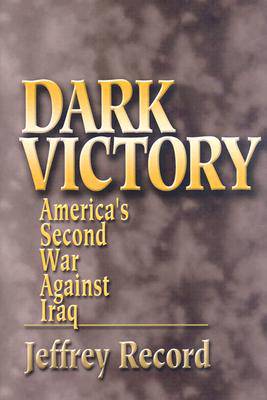
- Afhalen na 1 uur in een winkel met voorraad
- Gratis thuislevering in België vanaf € 30
- Ruim aanbod met 7 miljoen producten
- Afhalen na 1 uur in een winkel met voorraad
- Gratis thuislevering in België vanaf € 30
- Ruim aanbod met 7 miljoen producten
Zoeken
€ 31,45
+ 62 punten
Omschrijving
A prominent national security analyst provides a critical examination of the origins, objectives, conduct, and consequences of the U.S. war against Iraq in this major new study. Focusing on the intersection of world politics, U.S. foreign policy, and the invasion and occupation of Iraq, Jeffrey Record presents a full-scale policy analysis of the war and its aftermath. As he looks at the political and strategic legacies of the 1991 Gulf War, the impact of 9/11 and neo-conservative ideology on the George W. Bush White House, and the formulation of the Bush Doctrine on the use of force, he assesses rather than describes, judges rather than recites facts. He decries the Bush administration's threat conflation of Saddam Hussein's Iraq and Osama bin Laden's al-Qaeda, and calls U.S. plans inadequate to meet postwar challenges in Iraq. With the support of convincing evidence, the author concludes that America's war against Iraq was both unnecessary and damaging to long-term U.S. security interests. He argues that there was no threatening Saddam-Osama connection and that even if Iraq had the weapons of mass destruction that the Bush administration believed necessitated war, it could have been readily deterred from using them, just as it had been in 1991. Record faults the administration for preventive, unilateralist policies that alienated friends and allies, weakened international institutions important to the United States, and saddled America with costly, open-ended occupation of an Arab heartland. He contends that far from being a major victory against terrorism, the war provided Islamic jihadists an expanded recruiting base and a new front of operations against Americans. Such a solid, thought-provoking study merits attention.
Specificaties
Betrokkenen
- Auteur(s):
- Uitgeverij:
Inhoud
- Aantal bladzijden:
- 256
- Taal:
- Engels
Eigenschappen
- Productcode (EAN):
- 9781591147114
- Verschijningsdatum:
- 1/04/2004
- Uitvoering:
- Hardcover
- Formaat:
- Genaaid
- Afmetingen:
- 164 mm x 237 mm
- Gewicht:
- 489 g

Alleen bij Standaard Boekhandel
+ 62 punten op je klantenkaart van Standaard Boekhandel
Beoordelingen
We publiceren alleen reviews die voldoen aan de voorwaarden voor reviews. Bekijk onze voorwaarden voor reviews.











